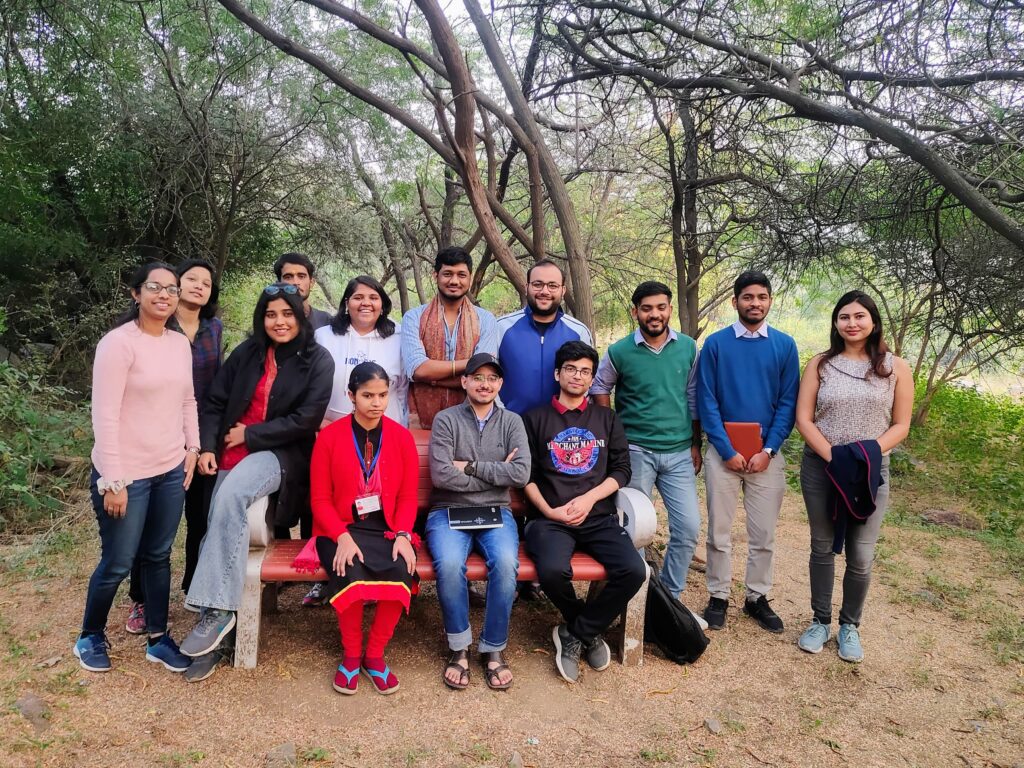
This blog provides discussion highlights for Sunday IR Cafe #37. Conducted on 27th November 2022, the discussion covered The Hindutva International and “Akhand Bharat” in V D Savarkar’s History of India.
Core Arguments:
- Atul Mishra’s paper focuses on V D Savarkar’s Six Glorious Epochs of Indian History to uncover the organicist conception of international in the thinking of the prominent Hindu nationalist leader. In going beyond the civilizational and geopolitical readings of Hindutva international thought, Mishra makes an original contribution to the growing literature on the ideological underpinnings of India’s internationalist thinking.
- Savarkar’s idea of the Hindu self saw political violence as a legitimate tool to defend the self, avenge past humiliation, and deter adversaries. His idea of history recognised its ontologically transformative potential in which history writing is put to the service of changing Indian social reality.
- Six Glorious Epochs, as Savarkar’s account of India’s past, divides the whole history into two periods- the ancient and the modern, with the Muslim invasion being the marker. The six glorious epochs, in his narration, are characterised by six rounds of successful Hindu repelling of foreign invasions of the Hindudom. The success of the Hindu polity can be explained by the organic unity of the Hindu nation. The caste system undergirds this organic unity.
- However, the partition of the Indian subcontinent in 1947 created the Akhand Bharat problematique for Savarkar. The partition led to not only a loss of territory but also resources and power. In contrast to the first set of four ancient invasions, the Muslim and Christian invasions were qualitatively different in posing both a geopolitical and cultural challenge to the Hindus due to their emphasis on conversion. The twin territorial and demographic challenges posed by Muslim presence in the subcontinent warrants a two-stage solution on Savarkar’s part. First, he prescribes the re-conversion of India’s Muslim population, followed by the undoing of Pakistan as a sovereign entity.
- Finally, Mishra argues that Savarkar’s organicist reading of the international and his approach to the Akhand Bharat problematique distinctly marks him apart from realist IR thinkers. Mishra also cautions against the tendency to dismiss the salience of the Akhand Bharat narrative, given its repeated invocation in recent discourse.
Discussion:
- Much of the IR scholarship on Hindutva focuses primarily on its pathological aspect. By engaging more substantively with Savarkar’s writing, Atul Mishra’s work differs in this respect by allowing it to speak for itself. The paper brings out the ‘civilisational’ account of the international in South Asia based on the self-other conception.
- The idea of Akhand Bharat is a totemic one. It should not only be seen as a bid for territorial control but also as concerned with civilizational sovereignty, the notion of civilizations exerting absolute control over a particular territory and staving off other civilizations’ attempts at encroachment. However, in today’s context, the Akhand Bharat project would indeed involve a geopolitical aspect to it, given that the civilizational contours of the Hindudom are occupied by several sovereign nation-states.
- Savarkar’s understanding of China was fairly benign. In the current context, given China’s treatment of Tibet, Bhutan, and Nepal, all territorial spaces with a special affinity with Akhand Bharat, Savarkar would have seen the Chinese civilization as inimical to the Hindudom.
- In contrast, it could also be argued that the Hindutva sees as more threatening the Western civilization and, as such, would prefer some sort of alignment with the Chinese civilization in the name of ‘Asian values’ to counter the West. As shown in Kanti Bajpai’s writing, this strand does actually exist within the Hindutva movement.
- On the relation between Hindutva and organicism, one implication of the paper’s research is that Hindutva shouldn’t be seen as a native ideology because of the influence of Spencer. However, in contrast, it can also be argued that the organicist roots of Hindutva need not be attributed to European sources. Rather, ancient Hindu texts like Vedas do contain organicist language. Hence, it would be a worthwhile exercise to investigate the domestic underpinnings of organicist metaphors in Indian nationalism. The motif of Bharat Mata can also be seen as another case of organicist language deployed by Indian nationalism. Deen Dayal Upadhayay’s concept of chitti has an organicist undertone but, at the same time, is rooted in the indigenous knowledge tradition.
- Atul Mishra’s pathbreaking work on the social Darwinian eugenicism and race-centric narrative found in Savarkar’s writings raises the issue of the relevance of such ideas in the contemporary context where Hindutva is increasingly the common sense ideology. The idea of Love Jihad deployed by the Hindutva leaders, in particular, can be seen as a manifestation of this social Darwinist strand in Savarkar’s vision if the love jihad bogey is interpreted as a concern with maintaining the purity of the Hindu body politic by not allowing marital ties with the Muslims, mediated by the idea of patriarchy which especially frowns upon Hindu women’s relationship with Muslim men.
- On the recurrence of the trope of violence in Savarkar’s writings which is supposed to evoke a strong emotion of hatred towards the other, an interesting parallel can be drawn with the European romantic movement, which saw in the perpetual struggle the path to a community’s rejuvenation. Hindutva’s constant search for an enemy, perceived or real, fits the bill. On Savarkar’s instrumental use of history to fashion nationhood in his favored image, it can be argued that using history in service of nation-building was part of the Nehruvian ruling regime as well.
- The contradiction that Atul Mishra points out between an academic pursuit of objective, value-free history and instrumental use of history for nationalist purposes is moot because of E H Carr. Carr taught us that history writing is not a completely objective collection of mere facts. Rather, the historian’s choice of certain facts and omission of others to build a narrative should tell us that all historical accounts, including the academic ones, reflect an imprint of the contemporary concerns that shape the way a historian looks at the past. Marxist and liberal accounts of Indian history also reflect a certain ideological approach and advance particular political concerns yet are treated as standard works of history in academia.
- However, one critique of this line of the argument can be that academic historians treat historical subjects with a degree of care and nuance based on a faithful reading of original sources. This nuance or rigor is sorely lacking in Savarkar’s historical account, given the sheer number of factual inaccuracies and implausible arguments.
- Savarkar’s understanding of the historical account’s ontologically transformative potential can be seen as a unique phenomenon in Indian intellectual life. The contemporary reflection of Savarkar’s belief in the ontologically transformative potential of historical accounts gets reflected in the Hindutva movement’s obsession with rewriting history today.
- On Savarkar’s uniqueness in deploying history as a tool for social transformation, however, it can be plausibly argued that it’s an overstated point. Indian nationalists and thinkers of all stripes have deployed history very creatively in support of their social vision and in service of their political goals, be it Phule, Gandhi, or the early liberals. On a related note, it can be argued that while the progressive/liberal vision of history is teleological with a belief in progress, Savarkar’s conception of history in Six Glorious Epochs is circular as Hindus repeatedly face invasion from outsiders and repel it successfully, time and again.
- The RSS’ main thrust can be seen in terms of creating a unity of Hindu society and culture. In this sense, RSS’ agenda can’t be seen mainly as a political one. Winning elections and enacting legislation, as per this view, are seen as adjunct tools used by the RSS in its pursuit of the goal of social transformation. However, in contrast to this view, if politics is to be defined broadly as control over power, ability to shape rules, and legitimacy of a certain set of ideas, then the RSS project is definitely a political one and a majoritarian one at that. Seen this way, the social vs political distinction does not seem that much valid.
- In conclusion, in highlighting the organicist register in Savarkar’s writing on international, Atul Mishra’s paper makes a truly groundbreaking contribution to the literature on Hindutva IR. On the relevance of the Savarkarite ideas in Six Glorious Epochs, it can be argued that the Hindutva obsession with history and its fixation with Hindu purity is a part of the Savarkarite lineage. On the viability of Savarkar’s solution to the Akhand Bharat problematique, at least the second stage of the solution can’t be implemented anytime soon, given the logic of nuclear deterrence and geopolitical considerations. Sans any significant attempt at geopolitical transformation, it is better to see the Akhand Bharat solution as a rhetorical device deployed by Hindutva leaders to placate their domestic base.
Author’s response:
I am grateful to the JNU IR Society for discussing my paper as part of their Sunday IR Café. I learnt a great deal from the rich and crisply-stated feedback on the paper, which the Society kindly shared with me upon my request. I should like to respond to three aspects on which I have some disagreements or where clarification is required:
- My account of the Savarkarite international and international relations is decidedly not civilizational. In fact, one of the core arguments of the paper is that alongside a geopolitical and a cultural-civilizational register of international relations, there is in Savarkarite thought, as articulated in SGE, an organicist account, one that is analytically and substantively distinct from the other two.
- On the genealogy of Savarkarite organicism, the influence of Spencer is clear. To me, there was no contest between a link (with Spencer and modern European organicism) for which there was clear evidence and a supposed link (with traditional Hindu thought) which I would have had to deduce and infer. The suggestion to look for the traditional corpus of Hindu thought has limitations, which I have discussed in this paper. One can make a case for a contextualized ecosystem approach to speculating about influences. And here, I’d have looked for modern ones, where Swami Vivekananda would be a strong candidate. More substantively, Savarkarite organicism is not restricted to the metaphorical level. There is a well-developed model, if not a theory, of organicist international relations in SGE which goes on to explain a key international pattern in Savarkarite historiography, namely invasion-resistance-defeat. Finally, and this should clinch the question of influence, Savarkar was a high modernist—as were Spencer and social Darwinism.
- Finally, on history. By ‘scientific history’, the paper does not mean empirical history. A nationalist historian can be strongly empiricist, but empiricism alone does not make something scientific. What is interesting about Savarkar is that he believes that if you are striving for objectivity and discernment of causal patterns, your narrative and conclusions will bear out the nationalist point of view. Hence the remark over consistency between science and nationalism in the historical domain. Savarkar’s belief that nationalist history can be scientific—not in the sense of being empirical but causative—is quite a curious one. Further, I am not sure if the belief that an understanding of history can be ontologically transformative is unique to Savarkar. Jawaharlal Nehru too held this belief. I have argued in my book The Sovereign Lives of India and Pakistan that Nehru’s The Discovery of India could be seen as an attempt to craft a post-independence national identity for India since the then-dominant notion that Indians were a nation because they shared their unfreedom in common would have ceased to be an effective glue after decolonization. If Savarkar’s assessment of Pakistan was rooted in his understanding of Indian history, then Nehru’s disapproval of the Pakistan movement rested on a progressivist philosophy of Indian history within which the movement was read as an atavism. In other words, both Savarkar and Nehru believed that social reality could not be grasped and therefore changed, ahistorically, though their conceptions of history greatly differed.

